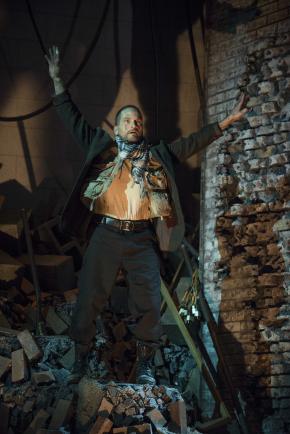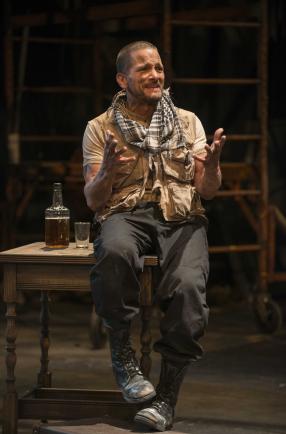“Sing, O muse, of the rage of Achilles, son of Peleus, that brought countless ills upon the Achaeans.”
What a juxtaposition...moving from the pastoral scene depicted in Edward Hicks' painting The Peaceable Kingdom to a powerful, moving theater performance at the Milwaukee Repertory Theater that tells the story of war. One war--the Trojan War--and yet it is a masterful condemnation of all the wars that mankind has waged. Adapted from Homer's Poem, The Illiad, it was a performance I will never forget. I have seen so many plays in my lifetime, and have witnessed amazing acting, but I can truthfully say I have never seen acting so powerful, so masterful, so moving. It will be a night I will remember forever. I have admired Jim DeVita's work on stage for many years at the American Player's Theater, an outdoor venue not too far from my home that specializes in Shakespearean productions. I've sat breathlessly through Jim's interpretations of Hamlet, MacBeth and Romeo and Juliet, but his demanding role in An Iliad left me speechless and stunned. I couldn't begin to describe it as well as the review in the Milwaukee Sentinel, so I hope you enjoy reading about the play and if you ever have a chance to see a production of it, please consider attending. You won't regret it.

American Players Theatre standout Jim DeVita now 53, freely admits that actors, like the rest of us, have stretches during which they wonder why they bother — and whether anyone out there is listening or cares.
But imagine being dogged by this sense of futility for 3,000 years. That's the situation confronting the bone-weary Poet in "An Iliad," a powerful, one-actor adaptation of Homer's poem by director Lisa Peterson and actor Denis O'Hare.
The Poet is described as "traveling for a very long time," and the opening lines of "An Iliad" explain why: He has been singing Homer's song — which focuses on the final weeks in the decade-long Trojan War, with all its mindless carnage and waste — since it was first written."Every time I sing this song, I hope it's the last time," the Poet tells his audience. But it never is, because that audience isn't listening hard enough to stop similarly avoidable wars.

While telling the story of that long ago conflict in Asia Minor, the Poet also is living with and referring to all the wars fought since — literally, at one point, during an extended, trance-like incantation in which he names more than 100 of them, from the Peloponnesian War to the civil war currently raging in Syria."The conceit is that he's been in every war, and seen young boys and women raped and bodies desecrated for thousands of years," DeVita said during a recent interview at the Rep, explaining why the burdened Poet struggles at first to even remember his lines.

"It's not just that he's tired of it," DeVita continued. "It's that it's right here on his chest and he can't imagine having to tell this story again. He's told this story tens of thousands of times and it hasn't made a difference. 'How,' he thinks, 'am I going to make a difference on this night?'"
One might just as well ask how one conveys the gist of Homer's sprawling poem — which comprises 24 books and more than 15,000 lines, and which would take 24 hours to read aloud — into an effective, 100-minute piece of theater. The answer involves skipping any effort to detail every Homeric battle and intrigue, although passages from Robert Fagles' great translation ensure that plenty of both remain, from Achilles' great rage through Hector's death and on to the Trojan grief and Greek pity that this needless death provokes.
But even as he recounts these iconic moments, the Poet is using Homer's poem to provide a visceral account of the horrors of war, through modernized images and stories that help bring it home to a contemporary audience.

"Time and again, the Poet urgently asks the audience, 'do you see?,' or 'imagine this,' or 'see this,'" DeVita said. "His main job as a storyteller is to really try to make us — today and now — see what war is like."
"So, for example, he'll start reciting the long passage where Homer names the places from which these thousands of Greeks are from. And when he sees that the audience isn't getting it, he starts over: 'So you know what it's like? It's like these boys are from Nebraska, and Florida, and Milwaukee and Kenosha,' and he'll go on with this huge list, naming American towns and cities. At the end of the list, he'll look out at the audience and say, 'Now do you see?'"
"The conceit, and it's brilliant, is that the Powerhouse has been hit by a bomb," DeVita said. "They're going to build a replica of a stage, and then tear it apart. Proscenium walls will be pulled apart and crushed down. The stage is going to look like it has holes. It will literally look as though Milwaukee has been in a war."
"I know it sounds weird," DeVita continued, "but this bombed-out set will make the space feel more intimate."

That sounds right; if the Poet's goal is to bring war home to his audience, having that audience enter such a playing space should make it easier to feel a kinship with the Poet and grasp what he means when, for example, he describes the trenches of World War I — or names the boys who died in them. In "An Iliad," the Poet does both.
DeVita also is convinced that the onstage presence of cellist Alicia Storin will further enhance the audience's appreciation of how this long-ago story remains a story for all of us.

"Just having the sound of a cello at times will evoke the women who are talked about in the play," DeVita said. "Seeing a woman out there alters the story. So often, women and children are the collateral damage in war. Alicia's presence, while I describe things like Hector's son being thrown from the battlements, will change how that account resonates."
"The Poet is losing his distance from his story," DeVita said, growing emotional as his voice dropped to nearly a whisper. "He is saying to himself — he is saying to us — that 'I don't think I can look at those young boys, 18 years old, slaughtered on the battlefield. I can't tell that story again tonight.'"

Perhaps a tough play to watch, comprehending the thousands of years of strife and sorrow that war has brought to each generation, but a performance of a lifetime and one I am so very glad I was able to see.
No comments:
Post a Comment